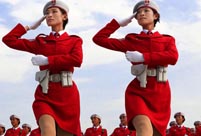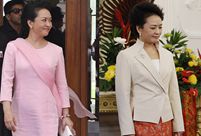 Bikini show in 2014 China Final of Miss Tourism World
Bikini show in 2014 China Final of Miss Tourism World
 Close-up view of August Aerobatic Team
Close-up view of August Aerobatic Team
 Goddesses married in 2014
Goddesses married in 2014
 Polar region photos raise worldwide awareness of global warming
Polar region photos raise worldwide awareness of global warming
 Get off at the last stop — Beijing Subway in vision
Get off at the last stop — Beijing Subway in vision
 Top 100 beauties in the world!
Top 100 beauties in the world!
 Gallery: Who is the most beautiful one?
Gallery: Who is the most beautiful one?
 If you like autumn, put your hands in the air!
If you like autumn, put your hands in the air!
 Fan Bingbing's "Queen style" in new play
Fan Bingbing's "Queen style" in new play
 Lingerie show at 2014 Miss China
Lingerie show at 2014 Miss China
BEIJING, Dec. 16 -- The New York Times is a major US newspaper that was established in September, 1851. In its 163-years history, it has won 114 Pulitzer prizes and claims to publish "all the news that's fit to print".
Despite its claim, however, it has been highly selective in publishing its news stories.
On Dec. 11, the newspaper published a story on Hong Kong police's clearing of the barriers and camps set up by the "Occupy Central" protestors. The report failed to mention the fact that the protest is illegal; instead, it has dubbed it as a "democratic" movement to convey the message that it is legal. Citing a protest participant, the story said: "We'll stop now, but that doesn't mean we're giving up. We'll be back for sure." It continued to incite trouble by citing a lawyer as saying: "Usually I would serve only my clients in the cell, but this time around I would be in the cell myself."
For the New York Times and some other Western newspapers, it is a delicate balancing act to select quotes by interviewees in the Hong Kong "Occupy Central" protest. They have selected quotes in a way that can fan the flames of trouble.
There are beggars just outside the New York Times building, but it is ridiculous to simply conclude that "beggars are prevalent in the United States". China has had some problems, difficulties and conflicts that have arisen during its fast development, but the Western media outlets should not exaggerate them to mislead the public opinion.
It is not the first time that the New York Times have opted to wear blinkers when it reports on China-related issues. In March, when the Malaysia Airlines Fight 370 disappeared, China tried its best to search for the plane. The New York Times published a report headlined "China's Actions in Hunt for Jet Are Seen as Hurting as Much as Helping". It went so far as to take advantage of the tragic accident to sensationalize the "China Threat" theory, claiming that China's regional competitors feel uneasy about China's fast-growing prowess of its military and its intention to send its military beyond its borders. Such an insinuation is inappropriate and inhumane when the world was searching for the lost passengers and crews.
In late January, a New York Times reporter was required to leave China for violation of the country's visa management rules. The newspaper, however, made an issue of the matter and published unreasonable stories accusing China of "punishing" the reporter for normal news coverage. On Nov. 13, the newspaper published an editorial saying that the Chinese leaders warned that the troubles of foreign press organizations are self-inflicted. "The message was clear: He (President Xi Jinping) was warning foreign news organizations that their troubles are self-inflicted; they are being penalized for unfavorable or controversial news coverage and could correct the problem by changing that approach." It went on to claim that it will not change its stance. "The Times has no intention of altering its coverage to meet the demands of any government — be it that of China, the United States or any other nation," the editorial said.
Although the newspaper has claimed repeatedly that it will only serve the truth, there have been many cases in its history that show it has cheated its readers and opted to use double standards in reporting. During the Kosovo War in the 1990s, former New York Times journalist Daniel Simpson said he was forced to take an anti-Serbia stance in news reporting. Later, he was required to report that the Serbians and the Iraqi government had weapons of mass destruction, which later turned out to be lies. Simpson left the newspaper and wrote a book revealing that the paper was peddling war propaganda.
On May 11, 2003, the newspaper admitted that its reporter Jayson Blair lied and faked stories. At least 36 out of his 73 stories involved cheating and plagiarism. It became a major scandal in the newspaper's history. Although it vowed to redress it, that such plagiarism and cheating could happen at such a famous newspaper is thought-provoking.
What is more notorious is that the newspaper spread lies that the Iraqi government had weapons of mass destruction to cater to the George W. Bush government's intention to wage a war against the Gulf country. Its reporter Judith Miller wrote a front-page report claiming that sources told her Iraq has large-scale weapons of mass destruction. She also cited unnamed US officials
and intelligence people as saying that the US had intercepted metal pipes for storage of nuclear raw materials in Iraq and the country was going to purchase raw materials worldwide to make nuclear bombs. The top US government officials often cited her reports in order to drum up support for the US invasion of Iraq.
Although the newspaper admitted later that those reports were unfounded, the harm has been done. Many troubles in today's world, especially in Middle Eastern countries, come from the Iraq War and many people, including large numbers of Iraqi people and American soldiers, died during the war. The war has opened a Pandora's Box and the New York Times has played a major role in that process.
The New York Times reports on China can hardly been seen as "honest" and "comprehensive". Through those reports, the readers can hardly know the historic advancement of the Chinese society and the "reform dividend" that China's peaceful development has brought to the world, including the United States. For those US people who have seldom gone beyond borders, it is hard to have good feelings towards China if they get to know China through New York Times' misleading and biased reports. In today's world, it is crucial for China and the United States to build a constructive relationship, but the biased coverage of China by the New York Times is far from being constructive.
The New York Times has demonized the word "communist". Although China has adopted market reforms and opened up to the world for more than thirty years, the newspaper remains blind to China's progress and attributes all the problems that have arisen during China's develop as results of "dictatorship", "lack of democracy" and "lack of freedom". Such a Cold-War mentality prevails in the New York Times, especially when it comes to issues related to China's Tibet and Xinjiang. Such misleading reports will only intensify the prejudice in the minds of some Americans and weaken the foundation for the healthy development of bilateral relations.
Behind such prejudiced and biased coverage of China is the newspaper's ignorance and arrogance. With a long history, China is the world's largest developing country with a population of 1.3 billion. When reporting on China, reporters need to take into consideration China's history and national conditions, which are very different from those of the West. Moreover, they need to have a knowledge of China's advancement instead of only focusing on China's problems. Otherwise, it will be hard for newspapers like the New York Times to have comprehensive and honest coverage of the real China. It is time the newspaper dropped its blinkers that have done harm to the world, including the United States.
Excerpts from a comment of People's Daily Wechat account
(Source: Chinadaily.com)
 Beautiful Chinese woman
Beautiful Chinese woman 20 years on: Relocated Three Gorges residents through lens
20 years on: Relocated Three Gorges residents through lens PLA HK Garrison veterans leave behind beautiful smiles
PLA HK Garrison veterans leave behind beautiful smiles Chestnut girl goes viral online
Chestnut girl goes viral online Representative beauties
Representative beauties Victoria's Secret Fashion Show
Victoria's Secret Fashion Show Excellent photos of Zhuhai Air Show
Excellent photos of Zhuhai Air Show In photos: Bright and brave female soldier of PLA
In photos: Bright and brave female soldier of PLA China's charming first lady
China's charming first lady A touch of salt
A touch of salt Open Internet not at odds with regulation
Open Internet not at odds with regulation Shanghai-HK stock plan adjusted
Shanghai-HK stock plan adjusted Experts, public torn on making APEC auto restrictions permanent
Experts, public torn on making APEC auto restrictions permanentDay|Week|Month